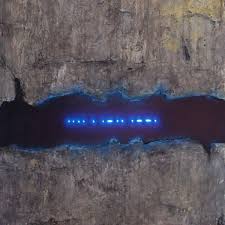Short for "folklore" and Cornish for "moon", the title of this second album by the mysterious Kemper Norton invokes both dream and myth. Like Carn, their first album released last year, it places its listeners on the southern coast of England, in Cornwall and Sussex, providing a guided tour of sorts to the resonance of places and their location in myth. On Carn this involved a deep connection with two locations where site-specific recordings were made in Iron Age burial chambers and hill forts, with which to gild their woozy, folk-stained weave of eerie acoustics and psychedelic electronics. Loor is conceptually a bit different, however: being entirely situated at night it forms a confluence of coastal myths and memories as experienced through dreams.
This unconscious dimension suits Kemper Norton’s idiosyncratically elusive sound well, while its outsider attitude to folk song gains greater confidence on Loor. Thankfully unconcerned with purist revival, instead it burrows folk’s musical modes to endow each composition with long, temporal threads spun from ancient times to be hand-sewn into a confusion of both faithfully acoustic and heretically digital instruments. These odd contrasts of modern and antique form a highly personal sound-world, but often with enough familiar matter to immediately engage its listeners in both disconcerting and dramatic ways, putting us somewhere akin to receiving word-of-mouth ghost stories or hallucinatory experiences.
Four of the most immediate pieces on Loor are based on traditional songs delivered in a tentative and gentle but beguiling voice: ‘Ostiaz’ eclipses the shimmering sunset of the opening track with a strange fanfare before a rudimentary hip hop beat underscores a creeping synth. The traditional lyrics from the trad ‘Night Visiting Song’ are delivered with a sense of trepidation, its original celebration of a chaste couple’s first night together (bound together at the waist by cloth to prevent hanky-panky) is creepily subverted to suggest the presence of an unknown other in the dark.
Though heavily masked in reverb, the vocals on ‘Cravenvale Round’ are from an "unknown Dartmoor wassail", relocating a pagan fertility rite to a suburb of Brighton known these days for its abundant allotments! The accompaniment of rich harmonium, delicious sub bass and spiralling organ has a haunting sense of devotion, conjuring images of a modern-day community group using ritual as its modus operandi. The forlorn love song, ‘Cityport Of Traps’, floats across an increasingly unstable mandolin to describe a restlessness, while its title perhaps betrays a youth spent buried in "fighting fantasy" books, the memories of which still echo in adult dream states.
While the last song on Loor has the sparest ingredients, yet is the most affecting. ‘All Through The Night’ maintains all the allure of this 18th century Welsh folk song (despite the erosive effects from earlier this century of Michael McDonald & Olivia Newton-John’s Christmas kitsch version) with just a crackling fire and the spreading vapours of harmonium shrouding the tenderly sung words.
Today, the act almost manages to be mythic in itself – Loor‘s press release refers to Kemper Norton in the plural, yet anyone fortunate enough to catch a live show will see a single figure flitting between mandolin and mic, harmonium and laptop – a bit like the revelation at the end of The Wizard Of Oz. Loor is also far from their second album, although the various download-only releases that preceded the two physical ones have been disappearing from Bandcamp, arguably at the same rate as their myth has been growing. Fortunately, some of these works are recycled on Loor, giving them a chance to be noticed outside the vast jungle of the internet, such as the melancholic ‘Requited’, originally ‘Unrequited 12’ from 2012, and ‘Helston 91’ which first appeared in 2010 to commemorate the "drugged terror and youthful joy" of a local festival. Both manage to sound like they’re played purposefully outdoors, in situ, through their fearless incorporation of field recordings. This exploits music’s all too under-used power to reunite memory and place, and perhaps sees Kemper Norton at its most evocative.
I’d like to think Loor‘s potent collision of memory and place, of ancient and modern, of hand-me-down stories and personal dreamscapes, might be excavated one day in the far future and puzzled over anew; where Kemper Norton’s extraordinary music would continue to extend myths of old, as well as creating new ones.
<div class="fb-comments" data-href="http://thequietus.com/articles/16679-kemper-norton-loor-review” data-width="550">


